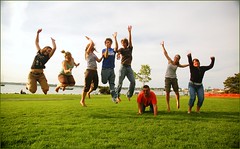
Tody's webinar (25 July 2012) was facilitated by Karen Melhuish (Enbling eLearning), and focussed on ways that we are engaging learners. The first thing the group did was reflected on a time when participants felt there were learning effectively. Some of the ideas included:
- context
- challenge
- relationships
- confidence
- emotions
- meaningful
Some of the comments included "When the teacher made the content personal to me" (Brent), "When I think back it was the teachers who wanted to hear from me. They wanted to know what I thought" (Paul), and "knowing it was something that I could do and be good at" (Janelle).
These themes underpinned the rest of the session. A videofrom featuring a learning experience at Kutere School was shared, and participants' thoughts discussed, and examples were shared. For example,
We strongly believe in just in time teaching - whether it is a writing skill, a technology skill - they want/need to know it to continue with their learning so are highly motivated and engaged with the new learning (Flexie)
Janelle Riki spoke about the relevance of the video to Maori learners, especially mana (a sense of can do), place-based education (could see themself in that context), learning from each other, and modelling watching and doing. There were also elements of being self-motivated, in particular when barriers were removed for them. Janelle has created an acronym Angitu Maori.
- Autonomy
- Negotiated curriculum - tailoring the curriculum
- Get to know your kids - relationships
- Involve whanau, iwi, hapu - the students cannot be separated from their whanau
- Te reo Maori
- Use, do, play, practice
- Manaakitanga
- Authentic contexts
- Outside the classroom - learning doesn't necessarily happen inside the classroom
- Regular physical activity - just having a chance to get out and run around can make all the difference to engagement
- Incorporate group competition - a chance to flex their mana, as well as to something for their iwi, hapu, and their mates
Self-management as a concept can be an issue for some Maori students as the notion of working together underpins their world view, which includes playing a role for the betterment of everyone.
Togi Lemanu spoke next with a specific focus on engaging Pasifika learners (some amazing stories on the Pasifika site on TKI http://pasifika.tki.org.nz/Media-gallery). He started by mentioning relationships, building relationships and creating rapport. In particular it is important to know where they comes from (Tonga, Samoa...there are many countries that comprise Pacific Peoples). The third point Togi made was around the importance of knowing about each student's culture, and the final point was creating a safe environment for all of these things to happen and where the student can explore. Once the students feel safe "that's when good things happen". It was emphasised that "schools need to go beyond the assessment process and summative data", and to include "Pacific perspectives in the curriculum", which provide a wide range of opportunities.
Brent asked what the keys are "to overcoming students who have poor attendance?". There were a range of replies, in particular the link between truancy and engagement. The Year 10 and 11 space appears to be the major time, and main reasons are engagement, as well as, sometimes, staying at home to look after younger sibilings. Brent followed up with the observation that it is "hard to gain momentum/engagement when attendance is poor..... thanks for your ideas". Sam asked if not being at school was the equivalent of not being engaged....!

Sam Cunnane facilitated next, and he introduced the Passionfruit project (see the video here). With a class of 20, the students collaborated together to create a magazine, and much of the project involved "handing over control to the students".
This was a really useful session with a good range of practical suggestions, as well of examples of what people are actually doing, and how it's working for them. Unfortunately the recording of the session was not successful, but the conversation will continue in a range of spaces. You can access the presentation here.
Many thanks to everyone who participated, including a group of 20 teacher's at Brent's school. And particular thanks to the facilitators, Karen, Janelle, Togi, and Sam.
Images
- Family Jump - Evil Erin
- Passionfruit, Granadilla, Passiflora edulis
- Whanau (Photo credit: Nicki-G)






No comments:
Post a Comment